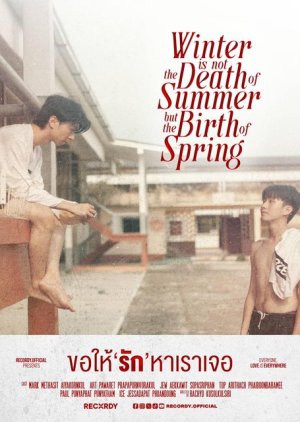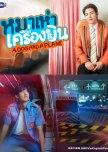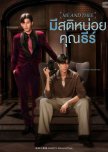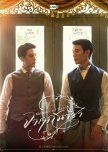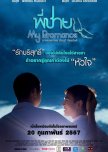Must watch!
Set in the unsual setting of a Thai prison, this story tells of the love blooming between two young inmates from different worlds. Its title reminds us that darkness holds the seed of light or, like the emblematic lotus, that beauty can grow from the mud. It is told, filmed and played with talent and a deep sensitivity which almost doesn't need words. At this stage (12 episodes shown so far out of 21), there is no saying where the story is actually going and how it will end. But one thing is for certain: this series is addictive, and the airing of 4 episodes at a time avoids the frustration short formats often bring to the viewers. I strongly recommend to watch it as well as one of these new opuses which lift the so-called "BL" genre out of cliches, and make it more mature.Was this review helpful to you?

First Impression: Winter is Not the Death of Summer but the Birth of Spring
Overall: I'm intrigued based on the unique premise. Airing on YouTube https://youtube.com/playlist?list=PL0Njz75725bXKH1h92Yn-RCgu5EZb_SW-&si=P7Jx-VCWqEIUqr_bContent Warning: non con touching
What I Liked
- unique premise
- caring moment/head on shoulder
- aired 4 episodes at once (as they are all less than 9 minutes if you take out the end credits)
Room For Improvement
- voice over exposition
- I'm not familiar with the Thai prison system but it seemed odd they had a fully stocked music room and library based on the other facilities
- not sure where they are going based on the ending of episode 4
Was this review helpful to you?

It is not original, but it is unrealistic in sweetening the reality of prisoners in Thai prisons
'A Prayer Before Dawn' is a prison drama directed by Jean-Stéphane Sauvaire. Based on a true story collected in the book "A Prayer Before Dawn: My Nightmare in Thailand's Prisons", by Billy Moore, it tells the life in prison of a young British man with a problematic past and addicted to heroin, who ends up being confined in one of the Thai prisons, considered among the most dangerous and inhumane in the world, for drug possession.In the film, the relief for the self-destructive life and mind of Billy Moore, masterfully played by Joe Cole, known for his role as Luke in the series 'Skins', John Shelby in 'Peaky Blinders' and Sean Wallace in 'Gangs of London', comes in the arms, lips and the inconstant sexual attentions of Fame (Pornchanok Mabklang), a ladyboy, with whom the main character will maintain a homosexual relationship, and the discipline of Muay Thai and boxing practiced by the British citizen.
The image that the West has about the life of a prisoner in Thai prisons, such as the Bangkok Hilton, which many call "The Great Tiger", one of the harshest prisons in the world, is consistent with the reality shown in this 2017 film: institutional corruption, extreme violence, overcrowding and unhealthiness where prisoners fight to survive in inhumane conditions.
The recent sentence to life imprisonment of chef Daniel Sancho, the son of renowned Spanish actor Rodrigo Sancho, for premeditated murder, dismemberment and concealment of the body of Colombian plastic surgeon Edwin Arrieta, on the tourist island of Koh Phangan, in southern Thailand, in August 2023, has once again brought to debate the inhumane situation experienced by prisoners in Thai prisons.
In addition to living with drug traffickers, pedophiles and murderers, between 30-60 prisoners survive in each cell, without water, electricity or hardly any food, with a single hole in the floor to relieve themselves. Fights over a crust of bread or a piece of soap, or to avoid being raped by other inmates and even by the guards themselves, are constant. If the prisoner runs with good luck, he will be cared for by a doctor and two nurses, alone, to provide medical care to thousands of inmates.
While in other prisons around the world convicts spend their time with the aim of reintegrating them back into society in most cases, going to prison in Thailand is simply a punishment.
In this scenario where the days are tremendously difficult and hard, in which crime and daily violence outside prison continue inside it, and survival is the greatest challenge, 'Winter Is Not the Death of Summer but the Birth of Spring' focuses on showing the life of the main character already inside a cold and hostile prison in Thailand. A voice-over, which tells us, during the first minutes of the plot, how he ended up there, helps us as viewers to become familiar with him from the moment he crosses the threshold of the prison and leaves his routine life behind.
The series follows a real love story between two inmates: "Jed", sentenced to one year and six months for a check fraud law, and Bible Khamphi, a young man guilty of illegal arms trade who must serve around four years, but as a model prisoner, after two years in prison, he could soon be released on parole. Although Bible seems indifferent to life, he possesses a magnetic attraction that attracts Pathomkan.
It is precisely the approach of anguish, oppression and confusion that Andy Rachyd Kusolkulsiri, known for directing numerous BL series and films, such as 'Love Sick Season 2', 'Make It Right: The Series' and 'Tom Gay', turns to tell us the story.
From the first scenes, the audience is able to perceive that the director does not stop to explain anything to us, he builds his main character as he goes and at the same time he inserts the other characters and subplots. The series manages to keep the viewer stunned and disoriented, holding Jed's hand in a prison that looks at him with brutality, leaving this peaceful and dejected man alone in the middle of a violent place, waiting to be rescued by a pious soul... or loving.
In addition to a love story, 'Winter Is Not the Death of Summer but the Birth of Spring' is a story of survival in prison conditions, something unusual in BL series, but it will show the desire for redemption and the search for light after the tunnel, with Jed waiting to get out of prison to dedicate himself to work, help his mother and pay off debts, and Bible with the truncated dream of finishing his studies in International Business Administration to continue a correct life away from crime.
Andy Rachyd Kusolkulsiri's camera takes us into the warlike Thai prison world. It shows sweaty and tattooed male bodies like emaciated flesh eager for violence, blood, nicotine, drugs and sex, a voracious hunger that never sleeps, where you have to fight to get a few drops of drinking water with which to quench your thirst, sleep carefully open and where a visit to a latrine can end in a gang rape, since the guards are not there to ensure the safety of the prisoners.
The explicitness of the acts of institutional corruption, authoritarianism and physical and psychological abuse, both by the guards and by the prisoners towards other prisoners, in a hierarchical order, of supremacy, remain in the feint and the attempt, and do not reach to show all the truth revealed in the first minutes after Jed's arrival in prison. The director chooses to avoid the underworlds that inhabit our same planet.
Jed is going to end up in prison for a crime committed, he will ask for bail, and the most terrifying thing is not the stay, but that he must denounce the smoking inmates, it does not matter if Bible is among them, as if he had a pact with the guards to obtain freedom or enjoy some privileges. This is something that shocks me, because I did not expect to witness an act of lack of camaraderie in the main character. I also don't understand how smokers are persecuted as if they were committing indiscipline, when cigarettes are brought into prison by the inmates' relatives during their scheduled visits.
The intrusion does not remain in the auditory, but also in the visual: down there, in the depths of hell, among dark men with elaborate tattoos, pronounced abdomen or extreme thinness, their pale skin and innocent gaze, in contrast to those around them, shine like a beacon, bringing to light the sexual desires of those who have not enjoyed sex in a long time. But we will only have a hint of this in the first scenes, since this phenomenon that is always present in prisons will soon be left aside, and that could provide drama and realism, to give way to the love story between the two protagonists.
It is the unfavorable side of justice, stuck within four narrow walls of an underworld, stuck inside the purest shit of the environment that surrounds him, Jet will try to find the light, that is, freedom. Or at least a relief for their tormented days.
An innocent young man, with an angelic look in a prison: in these circumstances, I hoped that the protagonist would live the pain of a traumatic experience that would allow him to draw life lessons and achieve redemption for his crimes. However, none of this is represented in the series. It seems that, instead of a prison, the prisoners enjoy a stay in a cheap and little-publicized hotel by the Thai Ministry of Tourism.
Another aspect to consider is the acting, where for obvious reasons, the majority is either novice actors or are not professional actors. Likewise, we have a notable work by Art Pawaret Prapapornvorakul, who plays Bible Khamphi, and Mark Methasit Aiyakornkul, who plays Jed, both in their debut in the entertainment industry.
Although it is original for a Thai LGBT+ series, its premise is not unique in world cinematography in telling a homosexual relationship in a prison in that Asian nation, nor is the label "based on a true story."
On the other hand, it seems to offer a sweetened and complacent image of the harsh conditions and life of the convicts, such as Jed's quiet walks through dubious and improbable reading and music rooms full of convicts, or the images of convicts kissing and enjoying sexual games in the light of day, under the gaze of anyone around them.
Despite not being realistic, the story moves in two directions: that of survival in a brutal environment, and the love that Jed finds in another inmate. That is to say, on the one hand it is an unpleasant series in substance and form that evolves in a rude manner to feed on violence and hostility, while on the other hand it offers the romantic rapprochement of two beings destined to suffer confinement.
Loaded with intrinsic dirt, the viewer waits anxiously to see if the next frame shows us even a drop of tenderness and redemption.
'Winter Is Not the Death of Summer but the Birth of Spring' has very powerful bases, since the presence of ladyboys is added to the above, which gives it an exotic touch. However, it fails to convince because it avoids showing a reality widely known to humanity: the darkness of confinement in a Thai prison.
In addition to the above, the lack of a budget that allows satisfactorily guaranteeing that all aspects of production are handled effectively and efficiently plays against the series, in order to better develop the story.
Due to its crudeness, the unusual settings, and the fact that it does not tell a romantic plot as lovers of the genre wish, it is not suitable for all audiences, but that does not mean its effort to tell a true story should be detracted, despite their failures.
Was this review helpful to you?

